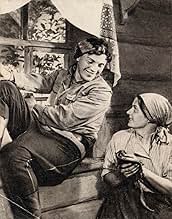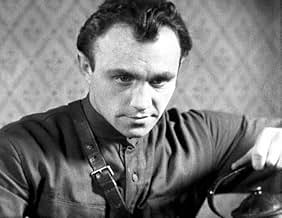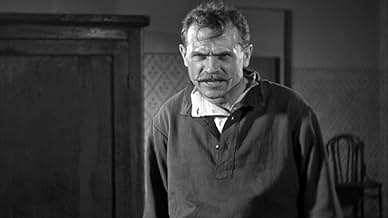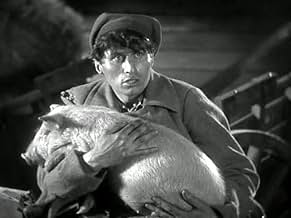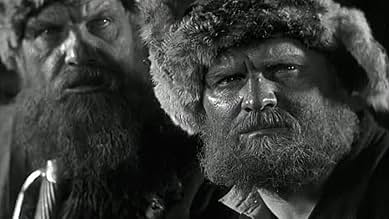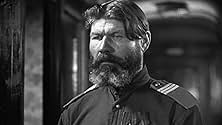NOTE IMDb
7,0/10
1,5 k
MA NOTE
Il raconte l'histoire de Vasily Ivanovich Chapaev (1887-1919), un commandant légendaire de l'Armée rouge qui est devenu un héros de la guerre civile russe.Il raconte l'histoire de Vasily Ivanovich Chapaev (1887-1919), un commandant légendaire de l'Armée rouge qui est devenu un héros de la guerre civile russe.Il raconte l'histoire de Vasily Ivanovich Chapaev (1887-1919), un commandant légendaire de l'Armée rouge qui est devenu un héros de la guerre civile russe.
- Réalisation
- Scénario
- Casting principal
- Récompenses
- 2 victoires au total
Illarion Pevtsov
- Colonel Borozdin - Sergey Nikolayevich
- (as I. N. Petsov)
Andrei Apsolon
- Red Army man
- (non crédité)
Emil Gal
- Tall Veterinary Surgeon
- (non crédité)
Mikhail Gipsi
- Red Army Soldier
- (non crédité)
Nikolay Kondratyev
- Partisan
- (non crédité)
Stepan Krylov
- Red Army man
- (non crédité)
Pavel Leshkov
- Col. Borozdin's interlocutor
- (non crédité)
Kasim Mukhutdinov
- Red Army man
- (non crédité)
Zula Nakhashkiyev
- Appearing
- (non crédité)
Konstantin Nazarenko
- Red Army Troblemaker
- (non crédité)
Avis à la une
The film is based on the diaries of Commissioner Furmanov, Chapayev's right-hand man and one of the heroes of the film. It tells the story of Vassiliy Ivanovich Chapayev, a Red Army hero during the Russian Civil War (1918-1922). The illiterate chief of a gang of marauding cavalry men is portrayed as a noble protector of the common folk and a brave soldier, a menace to the evil White Army. Interestingly enough, this 1930s war epic is mostly famous not for its Communist propaganda (nothing else can really be expected from Soviet movies of that period) or its realistic portrayal of the Civil War battles, but for a countless number of jokes and anecdotes about the movie heroes. In that sense Chapayev has become a huge part of the Russian street folklore and one of the most famous Soviet movies ever made. Vassiliy Ivanovich, Petka, Anka (the last two's romance is an interesting subplot in the film) and even the stoic Furmanov are laughed at by millions and millions of Russians for God knows how long now. As for the movie itself, it is far from a comedy although there are some light-hearted moments, mainly dealing with Chapayev's illiteracy and Petka's flirt with Anka. It may not be 100% true to history or to Furmanov's accounts (for example, the real-life Petka died a much more gruesome death than his movie counterpart) but it is an interesting look at the Civil War and one of its most legendary figures.
Vasiliy Chapaev wasn't one of the most famous figures in Russia's revolution. "Chapaev" takes a look at his deeds, employing socialist realism (the Red Army consists of glorious peasants while the White Army consists of regressive aristocrats). Whatever the purpose, the result is a fine piece of cinema: compelling characters, impressive camera work, and an incisive look at Russian culture. You don't have to know a lot about the Bolshevik Revolution to enjoy this movie (but it helps). Good one.
In the Soviet Union in 1934, this was a film about a popular war hero from a war that took place fewer than twenty years before. So I admit that, watching it in another country 2014 there may be quite a lot of context I'm missing. This is not a life of Chapev, whom everyone is presumed to know well, but a series of episodes from his career.
They are not all uninteresting or dull episodes, but the fact that it is so episodic rather than following a more complete story worked against it with me in this case.
It's inescapably hero-worship, and, commendably given that it is hero- worship, it does not try to portray its hero as immaculate. Chapaev is proud, short-tempered, and ignorant of politics and history. But this played against his advantages only serves to make him more of a hero.
It easy to see why this film became very popular -- it's good-humored, politically-correct for its political context, and appeals to existing conceptions of a popular hero. The battle scenes are staged on a big scale and are very impressive (though the ending seems quite abrupt). Taken out of its immediate context, though, it doesn't stand alone as well as a self-contained film for other audiences. But it remains a fascinating piece of history.
They are not all uninteresting or dull episodes, but the fact that it is so episodic rather than following a more complete story worked against it with me in this case.
It's inescapably hero-worship, and, commendably given that it is hero- worship, it does not try to portray its hero as immaculate. Chapaev is proud, short-tempered, and ignorant of politics and history. But this played against his advantages only serves to make him more of a hero.
It easy to see why this film became very popular -- it's good-humored, politically-correct for its political context, and appeals to existing conceptions of a popular hero. The battle scenes are staged on a big scale and are very impressive (though the ending seems quite abrupt). Taken out of its immediate context, though, it doesn't stand alone as well as a self-contained film for other audiences. But it remains a fascinating piece of history.
As others have noted, this is "Socialist Realism"-i.e. portraying things the way the Powers That Be WANT them to be portrayed. Stalin hadn't completely established his iron grip by 1934 so movie makers had a moderate amount of latitude but they still had to conform to The Party Line, hence a movie very similar to those we made during WWII-"Our" side is noble, just and honorable, the "Enemy: is evil, crass-and stupid. I saw this movie years ago when I was in a Russian language course in the Army, in a version with a modest amount of subtitles. I recall the attack of the Whites was labeled "The Psychological Attack"-they form up in closed ranks and advance over open terrain against Bolsheviks armed with machine guns and ALMOST succeed until Chapayev rallies the troops and repels them. Yeah, right.
Chapayev was an illiterate war hero in the Russian Revolution. He is an interesting character. Completely illiterate, he was an inspiration to his men by being simple, brave, modest and honest. Think G.C. Scott's "Patton" or "Sharpe's Rifles," this is Chapayev! It rings vaguely of propaganda, like most war films of the 30's. The White Guard officers are portrayed as greedy, abusive dilletantes, whereas Red Chapayev and his Bolshevik comrade and assistant are honest, wholesome folk. This film is a good war flick, and one interesting thing about it was that the brothers Vasiliev attempted to film everything in the actual locations where the battles took place. Chapayev really died where he did in the movie. Good for history buffs, definitely.
Le saviez-vous
- AnecdotesP.S. Chapaev and his assistants Petka and Anka are the popular characters of hundreds of Russian jokes.
- GaffesIn the movie Chapayev is riding a horse. However it could not be possible since Chapayev got a wound during WW1 and couldn't actually ride a horse. Furthermore as a commander of a shooting division he preferred riding a car.
- ConnexionsFeatured in Ya rodom iz detstva (1966)
Meilleurs choix
Connectez-vous pour évaluer et suivre la liste de favoris afin de recevoir des recommandations personnalisées
Détails
- Durée
- 1h 33min(93 min)
- Couleur
- Mixage
- Rapport de forme
- 1.37 : 1
Contribuer à cette page
Suggérer une modification ou ajouter du contenu manquant

